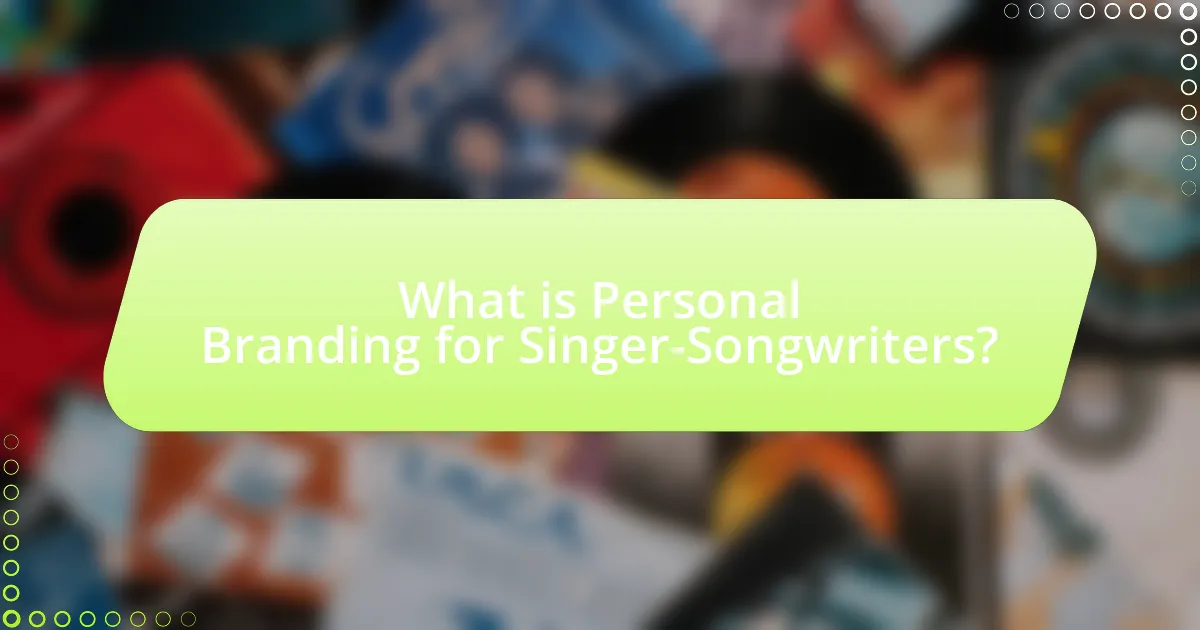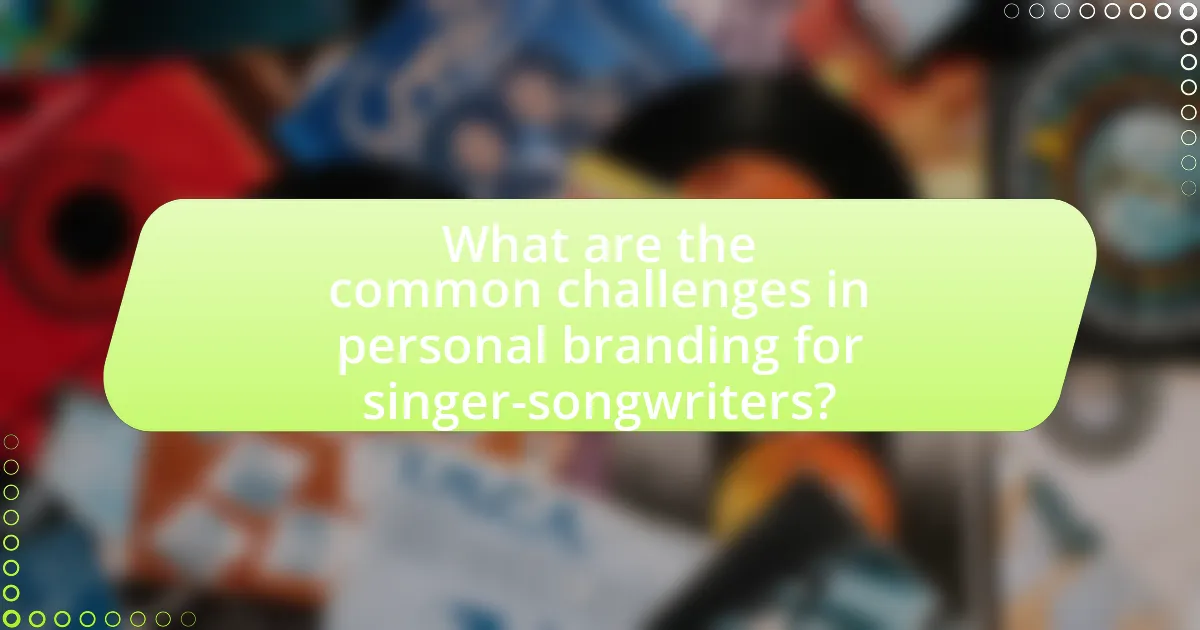The article focuses on personal branding for singer-songwriters, emphasizing the importance of creating a unique identity that distinguishes them in the music industry. It outlines how effective personal branding can enhance visibility, foster audience connection, and lead to commercial success. Key elements discussed include authenticity, consistency, and storytelling, which are crucial for engaging with fans and building loyalty. The article also addresses common challenges faced by artists in branding, strategies for audience engagement, and the role of social media in enhancing their personal brand. Overall, it provides insights into how singer-songwriters can develop and maintain a strong personal brand to thrive in a competitive landscape.

What is Personal Branding for Singer-Songwriters?
Personal branding for singer-songwriters is the process of creating a unique identity and image that distinguishes them in the music industry. This involves defining their artistic style, values, and personality, which helps to build a connection with their audience. Effective personal branding can lead to increased visibility, fan loyalty, and opportunities for collaboration and performance. According to a study by the Berklee College of Music, artists with a strong personal brand are more likely to engage their audience and achieve commercial success, highlighting the importance of a well-defined brand in the competitive music landscape.
How does personal branding impact a singer-songwriter’s career?
Personal branding significantly impacts a singer-songwriter’s career by shaping their public image and audience perception. A well-defined personal brand helps singer-songwriters differentiate themselves in a competitive music industry, allowing them to attract and retain a loyal fan base. For instance, artists like Taylor Swift and Ed Sheeran have successfully utilized personal branding to create a strong connection with their audiences, leading to increased album sales and concert attendance. Research indicates that 70% of consumers are more likely to support brands that align with their personal values, highlighting the importance of authenticity in personal branding for artists.
What are the key elements of effective personal branding?
The key elements of effective personal branding include authenticity, consistency, and visibility. Authenticity ensures that a singer-songwriter presents their true self, which fosters trust and connection with the audience. Consistency in messaging and visual identity across platforms reinforces brand recognition and reliability. Visibility, achieved through strategic marketing and engagement on social media, allows the artist to reach a broader audience and maintain relevance in a competitive industry. These elements collectively enhance the personal brand, making it memorable and impactful in the music landscape.
How does personal branding differentiate a singer-songwriter in the music industry?
Personal branding differentiates a singer-songwriter in the music industry by establishing a unique identity that resonates with audiences. This identity encompasses their musical style, visual aesthetics, and personal story, which collectively create a memorable image that sets them apart from competitors. For instance, artists like Taylor Swift and Ed Sheeran have effectively utilized personal branding to cultivate loyal fan bases by sharing their personal experiences and connecting emotionally through their music. This strategic approach not only enhances visibility but also fosters deeper connections with listeners, ultimately leading to increased engagement and commercial success.
Why is connecting with your audience essential for singer-songwriters?
Connecting with your audience is essential for singer-songwriters because it fosters emotional engagement and loyalty, which are critical for a successful music career. When singer-songwriters connect with their audience, they create a sense of community and belonging, leading to increased fan retention and support. Research indicates that artists who actively engage with their fans through social media and live performances see a significant boost in their following and concert attendance, with a study by the University of Southern California showing that personal interaction can increase fan loyalty by up to 30%. This connection not only enhances the artist’s brand but also drives sales and streaming numbers, making it a vital component of their overall success.
What strategies can singer-songwriters use to engage their audience?
Singer-songwriters can engage their audience by utilizing storytelling in their lyrics and performances. This strategy allows them to create emotional connections with listeners, making the music more relatable and memorable. Research indicates that storytelling can enhance audience engagement by up to 50%, as it fosters a deeper understanding and connection to the artist’s experiences and emotions. Additionally, incorporating interactive elements, such as Q&A sessions or social media engagement, further strengthens this connection, allowing fans to feel involved in the artist’s journey.
How does audience connection influence a singer-songwriter’s success?
Audience connection significantly influences a singer-songwriter’s success by fostering loyalty and engagement, which directly impacts their popularity and sales. When singer-songwriters establish a strong emotional bond with their audience, they create a dedicated fan base that is more likely to attend concerts, purchase music, and promote their work through word-of-mouth. Research indicates that artists who actively engage with their fans on social media platforms see a 30% increase in concert attendance and a 25% boost in merchandise sales. This connection not only enhances the artist’s visibility but also cultivates a sense of community, making fans feel personally invested in the artist’s journey.
What role does storytelling play in personal branding?
Storytelling is essential in personal branding as it creates an emotional connection between the artist and their audience. This connection fosters authenticity and relatability, which are crucial for singer-songwriters aiming to engage listeners. Research indicates that narratives can increase audience retention by up to 65%, making storytelling a powerful tool for memorable branding. By sharing personal experiences and insights through their music and public persona, singer-songwriters can differentiate themselves in a competitive market, enhancing their brand identity and loyalty among fans.
How can singer-songwriters craft their personal stories effectively?
Singer-songwriters can craft their personal stories effectively by using authentic experiences and emotions to create relatable narratives. This approach allows them to connect deeply with their audience, as studies show that authenticity in storytelling enhances listener engagement and emotional resonance. For instance, a survey by the National Endowment for the Arts found that 70% of audiences prefer artists who share genuine personal experiences in their work. By weaving specific details and vivid imagery into their lyrics, singer-songwriters can evoke strong emotions and foster a sense of intimacy with listeners, making their stories more impactful and memorable.
What are the benefits of authentic storytelling in music branding?
Authentic storytelling in music branding enhances emotional connection with audiences, fostering loyalty and engagement. By sharing genuine narratives, artists create relatable experiences that resonate deeply with listeners, leading to increased fan retention. Research indicates that brands utilizing storytelling can achieve a 22% increase in engagement, as emotional connections drive consumer behavior. Furthermore, authentic storytelling differentiates artists in a saturated market, allowing them to establish a unique identity that attracts a dedicated following. This approach not only builds trust but also encourages word-of-mouth promotion, amplifying reach and visibility in the music industry.

How can singer-songwriters develop their personal brand?
Singer-songwriters can develop their personal brand by clearly defining their unique musical style and message. This involves identifying their target audience and consistently communicating their artistic vision through social media, music releases, and live performances. For instance, successful artists like Taylor Swift have effectively used storytelling in their lyrics and social media engagement to create a relatable persona, which has significantly contributed to their brand identity. Additionally, maintaining authenticity and engaging with fans through interactive platforms can strengthen their connection and enhance brand loyalty.
What steps should singer-songwriters take to establish their brand identity?
Singer-songwriters should define their unique sound and style to establish their brand identity. This involves identifying their musical influences, lyrical themes, and visual aesthetics that resonate with their artistic vision. By creating a consistent image across social media platforms, album artwork, and promotional materials, they can effectively communicate their brand to their audience. Additionally, engaging with fans through live performances, social media interactions, and storytelling can strengthen their connection and enhance brand loyalty. Research indicates that artists who maintain a cohesive brand identity are more likely to attract and retain a dedicated fan base, as seen in the success of artists like Taylor Swift and Ed Sheeran, who have effectively crafted their personal brands through distinct musical styles and relatable narratives.
How do visuals and aesthetics contribute to a singer-songwriter’s brand?
Visuals and aesthetics significantly enhance a singer-songwriter’s brand by creating a distinct identity that resonates with audiences. This identity is often established through album artwork, music videos, and social media presence, which collectively convey the artist’s style, message, and emotional tone. For instance, artists like Taylor Swift and Billie Eilish utilize specific color palettes and visual themes that align with their musical narratives, reinforcing their brand image. Research indicates that consistent visual branding can increase audience recognition by up to 80%, demonstrating the effectiveness of visuals in establishing a memorable brand.
What platforms are most effective for building a personal brand?
The most effective platforms for building a personal brand include Instagram, YouTube, and TikTok. Instagram allows singer-songwriters to showcase their music visually and engage with fans through stories and posts, with over 1 billion monthly active users enhancing reach. YouTube serves as a powerful platform for sharing music videos and tutorials, boasting over 2 billion users, which facilitates deeper connections through video content. TikTok, with its rapid growth and 1 billion monthly active users, enables artists to create viral music snippets, fostering audience engagement and brand visibility. These platforms collectively provide diverse avenues for singer-songwriters to connect with their audience and enhance their personal brand.
How can social media enhance a singer-songwriter’s personal brand?
Social media can enhance a singer-songwriter’s personal brand by providing a platform for direct engagement with fans and showcasing their music and personality. This engagement fosters a sense of community and loyalty among followers, which is crucial for building a personal brand. For instance, artists like Taylor Swift and Ed Sheeran utilize platforms like Instagram and Twitter to share personal stories, behind-the-scenes content, and interact with fans, resulting in increased visibility and a stronger brand identity. Research indicates that 78% of musicians believe social media is essential for their career growth, highlighting its importance in personal branding.
What types of content should singer-songwriters share on social media?
Singer-songwriters should share a variety of content on social media, including original music, behind-the-scenes footage, personal stories, live performances, and interactive posts. Original music showcases their talent and engages listeners, while behind-the-scenes footage provides insight into their creative process, fostering a deeper connection with fans. Personal stories humanize the artist, making them relatable, and live performances allow fans to experience their music in real-time. Interactive posts, such as polls or Q&A sessions, encourage audience participation and strengthen community ties. This diverse content strategy is supported by research indicating that varied content increases audience engagement and loyalty among musicians.
How can engagement on social media platforms foster audience connection?
Engagement on social media platforms fosters audience connection by facilitating direct interaction between singer-songwriters and their fans. This interaction allows artists to share personal stories, respond to comments, and create a sense of community, which enhances emotional ties. Research indicates that 78% of consumers feel more connected to a brand when it engages with them on social media, demonstrating the effectiveness of engagement in building relationships. By consistently engaging with their audience, singer-songwriters can cultivate loyalty and a deeper understanding of their fans’ preferences, ultimately strengthening their personal brand.

What are the common challenges in personal branding for singer-songwriters?
Common challenges in personal branding for singer-songwriters include establishing a unique identity, navigating social media effectively, and managing public perception. Singer-songwriters often struggle to differentiate themselves in a saturated market, where numerous artists compete for attention. Additionally, effectively utilizing social media platforms to engage with fans while maintaining authenticity can be difficult, as the pressure to present a polished image may conflict with genuine self-expression. Furthermore, singer-songwriters must carefully manage public perception, as negative feedback or controversies can significantly impact their brand and career trajectory. These challenges highlight the complexities of building a personal brand in the music industry.
What obstacles do singer-songwriters face in building their brand?
Singer-songwriters face several obstacles in building their brand, including limited financial resources, intense competition, and the challenge of effectively marketing themselves. Limited financial resources restrict their ability to invest in professional recording, promotion, and distribution, which are crucial for brand visibility. Intense competition arises from a saturated music industry where numerous artists vie for attention, making it difficult for individual singer-songwriters to stand out. Additionally, the challenge of effectively marketing themselves often stems from a lack of knowledge or experience in branding strategies, social media engagement, and audience connection, which are essential for establishing a recognizable and relatable brand.
How can singer-songwriters overcome negative perceptions or feedback?
Singer-songwriters can overcome negative perceptions or feedback by actively engaging with their audience and using constructive criticism to improve their craft. By addressing feedback directly, they demonstrate a willingness to grow and adapt, which can foster a stronger connection with their listeners. Research indicates that artists who interact with their fans through social media and live performances can mitigate negative perceptions, as this transparency builds trust and loyalty. For instance, a study published in the Journal of Marketing Research found that artists who respond to criticism positively can enhance their public image and increase fan engagement.
What strategies can help maintain authenticity while branding?
To maintain authenticity while branding, singer-songwriters should focus on storytelling, consistent messaging, and genuine engagement with their audience. Storytelling allows artists to share their personal journeys and experiences, creating a relatable narrative that resonates with fans. Consistent messaging across platforms reinforces the artist’s identity and values, ensuring that the audience perceives a cohesive brand. Genuine engagement, such as responding to fan interactions and sharing behind-the-scenes content, fosters a sense of community and trust. These strategies are supported by research indicating that authenticity in branding leads to stronger emotional connections with audiences, ultimately enhancing loyalty and support for the artist.
How can singer-songwriters measure the effectiveness of their branding efforts?
Singer-songwriters can measure the effectiveness of their branding efforts through metrics such as audience engagement, social media analytics, and sales data. Audience engagement can be assessed by tracking likes, shares, comments, and overall interaction on platforms like Instagram and Facebook, which indicates how well their brand resonates with fans. Social media analytics tools provide insights into follower growth, demographic information, and content performance, allowing artists to refine their branding strategies. Additionally, analyzing sales data from music downloads, merchandise, and concert tickets can reveal the financial impact of branding efforts, with increased sales often correlating to stronger brand recognition and loyalty.
What metrics should be tracked to assess audience engagement?
To assess audience engagement, key metrics include social media interactions, website traffic, email open rates, and content shares. Social media interactions, such as likes, comments, and shares, indicate how well content resonates with the audience. Website traffic metrics, including page views and time spent on site, reveal audience interest and engagement levels. Email open rates measure the effectiveness of communication and audience connection, while content shares reflect the audience’s willingness to promote the artist’s work. Tracking these metrics provides a comprehensive view of audience engagement and helps tailor strategies for deeper connections.
How can feedback be utilized to refine personal branding strategies?
Feedback can be utilized to refine personal branding strategies by providing insights into audience perceptions and preferences. By actively seeking and analyzing feedback from fans, peers, and industry professionals, singer-songwriters can identify strengths and weaknesses in their branding efforts. For instance, surveys or social media polls can reveal which aspects of their image resonate most with their audience, allowing them to adjust their branding accordingly. Research indicates that brands that engage with customer feedback see a 20% increase in customer satisfaction and loyalty, demonstrating the effectiveness of this approach in enhancing personal branding.
What are the best practices for successful personal branding?
The best practices for successful personal branding include defining a clear and authentic identity, consistently communicating that identity across platforms, and engaging with the audience. Defining a clear identity involves understanding personal values, strengths, and unique qualities that differentiate a singer-songwriter from others. Consistent communication means using the same visual elements, tone, and messaging across social media, websites, and promotional materials, which helps in building recognition and trust. Engaging with the audience through regular interactions, responding to comments, and sharing personal stories fosters a deeper connection, enhancing loyalty and support. These practices are supported by research indicating that consistent branding can increase audience recognition by up to 80%, as noted in a study by the University of Massachusetts.
How can singer-songwriters continuously evolve their brand?
Singer-songwriters can continuously evolve their brand by actively engaging with their audience through social media, experimenting with new musical styles, and collaborating with other artists. Engaging with fans on platforms like Instagram and TikTok allows them to receive real-time feedback and adapt their content accordingly. Experimenting with different genres or incorporating diverse influences can attract new listeners and keep their sound fresh. Collaborations with other musicians not only expand their reach but also introduce them to different fan bases, enhancing their brand visibility. These strategies are supported by the fact that artists who frequently interact with their audience and diversify their musical offerings tend to maintain relevance in the rapidly changing music industry.
What tips can help singer-songwriters maintain a strong connection with their audience?
Singer-songwriters can maintain a strong connection with their audience by engaging authentically through storytelling in their lyrics and performances. Authentic storytelling resonates emotionally with listeners, fostering a sense of relatability and connection. Research indicates that emotional engagement in music can enhance listener loyalty, as seen in a study published in the Journal of Music Psychology, which found that songs with personal narratives significantly increased audience attachment. Additionally, regular interaction on social media platforms allows singer-songwriters to share behind-the-scenes content and personal insights, further strengthening their bond with fans.
